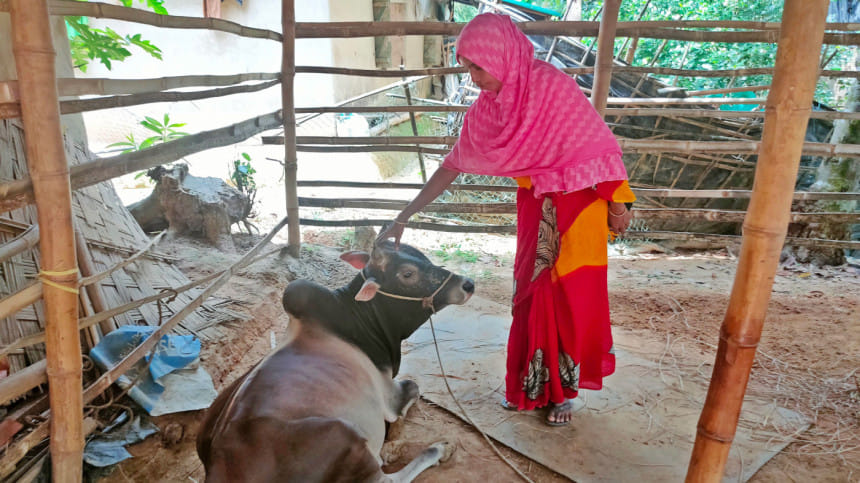Empowering women in Ukhiya, Teknaf

Anjuman Ara, 34, of Bhalukiya Palang village in Ukhiya and her two children had to survive on stale rice and vegetables. Her life turned around when took up kitchen gardening work a couple of years ago.
"I am now financially independent," said Anjuman, who is also engaged in cattle farming and tailoring works.
Her husband Syed Alam, 35, runs a tea-stall from which he earns around Tk 500-600 daily.
Anjuman Ara is one of the 2,000 beneficiaries (1,238 from Ukhiya and 762 from Teknaf) of Brac's ultra-poor graduation (UPG) programme's one-year pilot project for establishing a link between local cultivators and the market.
"I could barely make Tk 1,000 per week by selling 10kg vegetables, but now I can sell the same amount for a doubled price, thanks to market linkage. No one can deceive me anymore," added Anjuman.
Anjuman collaborates with other women from her neighbourhood to collect more produce, which she later sells at the market.
"Smaller quantity means smaller profit margins. So I source vegetables from others like me and sell them to retailers for a better price," she mentioned.
During a recent visit, this correspondent had the chance to speak with several other women who echoed the same.
MULTIPLIED INCOME SOURCE AND MARKET LINKAGE
Through the project, these extremely low-income women have learned to boost income, interact directly with market participants, build networks, and have access to crucial market data.
Josna Akter, who used to be a homemaker about two years ago, had to rely on her husband's income. However, things changed when she was leased 24-katha land and a goat as assets under the programme.
"I have four goats, 35 chickens, and four pigeons. In addition, I took a loan of Tk 50,000 from Brac to expand our income sources by establishing a shop which my husband manages. Together, we earn around Tk 20,000 per month," said Josna, another beneficiary of the project.
These women face challenges in entering the market because they cannot supply in bulk. Their condition is further exacerbated by instabilities caused by the Rohingya influx, said Upoma Mahbub, senior manager, Advocacy of the UPG programme.
In 2021, 2,000 women completed the two-year programme and subsequently participated in a year-long market linkage pilot initiative in 2022, she said.
"We offer asset transfers, technical and soft skill training, financial literacy, savings, and linkage to the government's social safety net, all of which are delivered through hands-on coaching," she further explained.
CHANGING LIVES IN UKHIYA
Around 16.6 percent of Cox's Bazar's population lives below the poverty line, according to the World Bank and 2016 poverty maps.
Women in Ukhiya are facing serious challenges, as they even have to struggle to ensure two meals a day. However, the reality is now different, as people like Josna and Anjuman are now bringing about positive reformations.
"I received a cow and its food from the project. With time, I increased the number of cows, as they were assets. I sold three cattle for Tk 2.12 lakh, making around 90,000 as profits," shared Anjuman who now looks to ensure education for her children.
A recent Brac survey on market linkage intervention revealed a 3 percent increase in profits, a 13 percent reduction in production costs, and a 63 percent increase in the selling ratio of their products compared to individual efforts.
"We now want to scale up this initiative across the entire nation within the next couple of years," said Upoma.

 For all latest news, follow The Daily Star's Google News channel.
For all latest news, follow The Daily Star's Google News channel. 



Comments